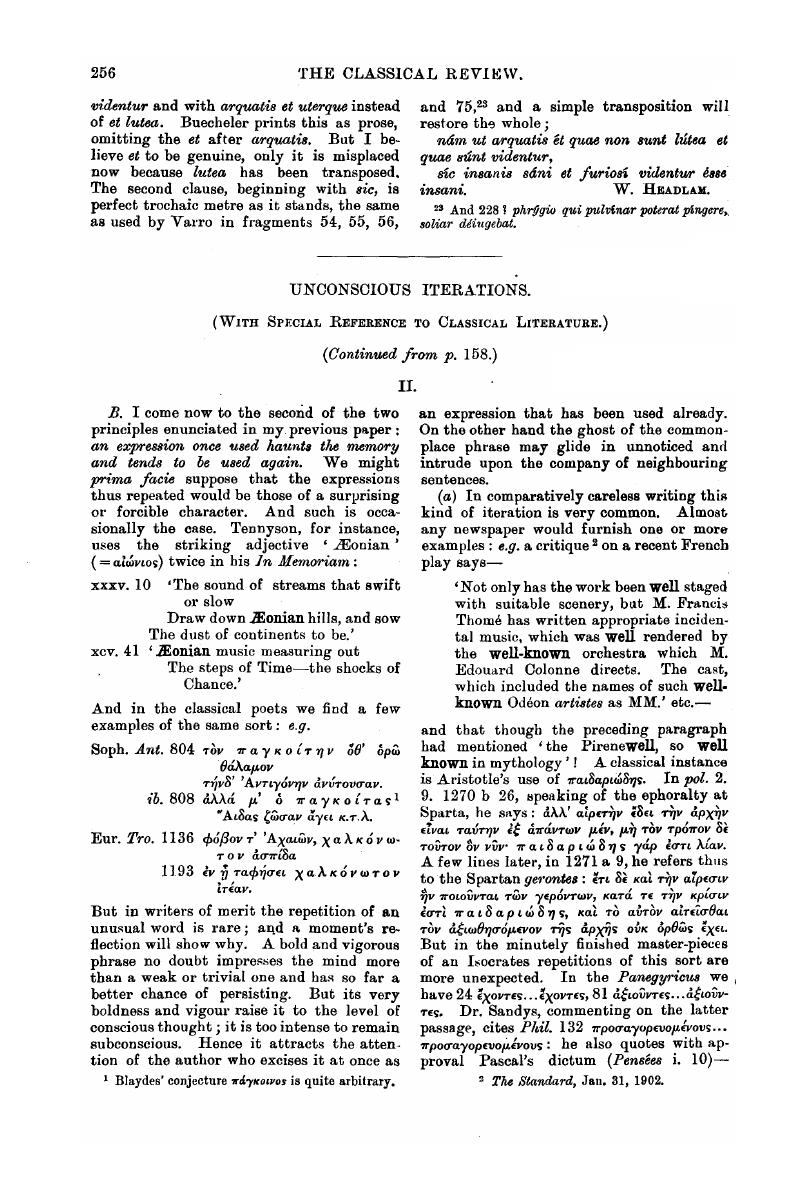No CrossRef data available.
Article contents
Unconscious Iterations
Published online by Cambridge University Press: 27 October 2009
Abstract

- Type
- Review Article
- Information
- Copyright
- Copyright © The Classical Association 1902
References
page 256 note 1 Blaydes' conjecture πάλκοινος is quite arbitrary.
page 256 note 3 The Standard, Jan. 31, 1902.
page 258 note 1 Bücheler accepts Rivinus' cj. marinis.
page 258 note 2 The Standard, Dec. 12, 1901.
page 258 note 3 I do not of course deny that a word may be used twice with a different meaning, even in a short passage, and yet involve no such subconscious (still less any conscious) persistence. The St. James's Gazette, March 18, 1902, says of the vest of King Charles I— ‘After the execution it came into the hands of Dr. Hobbs, the King's physician, who attended him on the scaffold, and from him it passed into the possession of Susannah Hobbs, who married Temple Stanger, of Rawlings, Oxfordshire. In the autumn of 1898 this “sky-blue vest” was bought by the late Mr. Brocklehurst for 200 guineas. Now it is offered for sale by order of his executors.’
page 260 note 1 With Nauck's reading οὐρανίᾀ we must translate: ‘and even as a puff of smoke beneath the wings of the wind, so does’ etc. But is 
page 260 note 2 In fact Dr. Jackson suggested that for the first οὐσíας we should read φύσεως.
page 260 note 3 Plato's proneness to iteration has been illustrated by Schanz Nov. comm. Plat. p. 10 f.
page 261 note 1 Metaphysical Basis of Plato's Ethics, p. 55.
page 261 note 2 See further the references collected by Professor J. E. B. Mayor on Juv. 10. 122.
page 262 note 1 This form of repetition is often conscious and deliberate, e.g. Lucr. 5. 298 f., 950 f. See Munro on 2. 955.
page 262 note 2 On the other hand writers of more taste avoided such combinations. Frag. 12 of Isocrates' techne prohibits the ending of one word and the. beginning of another with the same syllable (
page 263 note 1 So Dindorf with the MSS. Prof. Tyrrell ad loe. would read 
page 264 note 1 Other examples are Aeschylus' use of the word εὐθενεῖν and of the phrase πολισσοῦχοι θεοί. The former is found in Eum. 895, 908, 944, only. The latter, in suppl. 493, sept. 69, 185, 271, Ag. 838.
page 264 note 2 Note that in Aesch. sept. 192 

page 264 note 3 B. Gerathewohl ‘Grundzüge für lateinische Alliterationsforschung’ (Verhandl. d. Vers. deutech, Philol. u. Schulm. in München 1891) pp. 235–243, Paul Grundris d. german. Philologie i2 p. 357, Kap. 5 § 23, etc.
page 264 note 4 See O. Dingeldein der Reim bei den Griechen u. Romern Leipzig 1892, F. Dörr der Reim bei den Griechen Leipzig 1857, E. Wölfflin der Reim im Lot. in Archiv f.lot. Lexikogr. i. 350 ff., iii. 443 ff., ix. 567 ff.
page 264 note 5 On the frequency with which Isaeus reiterates his thoughts without change of wording see Blass Att. Ber. 2 ii. 524 ff., 680, 540, iii. 222. In his case it is difficult to decide how far ‘diese auffalligen Wiederholungen’ were due to nature and how fax to art. Rhetorical ἐπιμονῄ is, if I am right, only an artificial cultivation of natural insistence.
page 264 note 6 Beatson's Indices are by no means complete: but he quotes 105 examples of δοκἐω from Sophocles as against 55 from Aeschylus and 121 from Euripides. The proportion, if we take into account the number of extant plays, suggests that δοκἐω was a favourite word with Sophocles.
page 265 note 1 See further C. Rieck de proprietatibus quibusdam sermonis Euripidei Halle 1877 p. 28 ff.
page 265 note 2 In vv. 488–488 four lines out of six have ‘corpore’ or ‘corpora’ in the fifth foot.
page 265 note 3 Two consecutive hexameters end with ‘viator’ in Hor. sat. 1. 5. 16 f.
page 265 note 4 F. Mezger Pindars Siegeslieder, Vorwort p. vi.
page 265 note 5 J. B. Bury The Isthmian Odes of Pindar, Preface p. vii. f.
page 266 note 1 See Faust progr. progymn. Altkirch. 1881, p. 8, F. Schröder de iterates apud tragicoa Grraecos, p. 6. n. 1.
page 266 note 2 This ode contains reminiscences of Pyth. vi. Prof. Bury p. 82 enumerates them and admits: ‘It was indeed natural that echoes of the old song should haunt the dimmer corridors of the new song.’
page 266 note 3 To test my feeling in the matter I took an elegy of Propertius (1.3) with the following result: 2 1anguida = 38 languidus, 2 desertis = 43 deserta, 3 somno = 25 somno = 41 somnum, 4 duris = 14 durus, 5 fessa = 42 fessa, 8 manibus = 16 manu = 24 manibus, 10 nocte = 37 noctis = 39 noctis, 12 molliter…toro = 34 molli…toro, 13 iuberent = 40 iubes, 15 leviter = 43 leviter, 19 fixus = 84 fixa, 19 ocellis = 33 ocellos, 28 lapsos = 45 lapsam, 32 moraturis = 44 moras.




